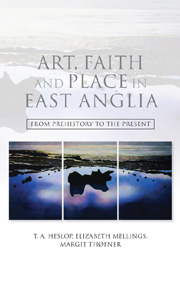Book contents
- Frontmatter
- Contents
- Acknowledgements
- List of illustrations
- CHAPTER 1 ‘Introduction: On Faith, Objects and Locality’
- CHAPTER 2 ‘But where is Norfolk?’
- CHAPTER 3 ‘Sacred Image and Regional Identity in Late-Prehistoric Norfolk’
- CHAPTER 4 ‘Piety from the Ploughsoil: Religion in Roman Norfolk through Recent Metal-Detector Finds’
- CHAPTER 5 ‘Paganism in Early-Anglo-Saxon East Anglia’
- CHAPTER 6 ‘Devotion, Pestilence and Conflict: The Medieval Wall Paintings of St Mary the Virgin, Lakenheath’
- CHAPTER 7 ‘Here Be Dragons: The Cult of St Margaret of Antioch and Strategies for Survival’
- CHAPTER 8 ‘The Medieval Jews of Norwich and their Legacy’
- CHAPTER 9 ‘Late-Medieval Glass-Painting in Norfolk: Developments in Iconography and Craft c.1250–1540’
- CHAPTER 10 ‘Graffiti and Devotion in Three Maritime Churches’
- CHAPTER 11 ‘Norfolk Wayside Crosses: Biographies of Landscape and Place’
- CHAPTER 12 ‘Landscapes of Faith and Politics in Early-Modern Norwich’
- CHAPTER 13 ‘Practice and Belief: Manifestations of Witchcraft, Magic and Paganism in East Anglia from the Seventeenth Century to the Present Day’
- CHAPTER 14 ‘Provinciality and the Victorians: Church Design in Nineteenth-Century East Anglia’
- CHAPTER 15 ‘Maharajah Duleep Singh, Elveden and Sikh Pilgrimage’
- CHAPTER 16 ‘Supernatural Folklore and the Popular Imagination: Re-reading Object and Locality in Mid-Nineteenth-Century Norfolk’
- CHAPTER 17 ‘Pro Patria Mori: Christian Rallies and War Memorials of Early-Twentieth-Century Norfolk’
- CHAPTER 18 ‘Pagans in Place, from Stonehenge to Seahenge: “Sacred” Archaeological Monuments and Artefacts in Britain’
- CHAPTER 19 ‘Art, Spirit and Ancient Places in Norfolk’
- CHAPTER 20 ‘Sacred Sites and Blessed Objects: Art and Religion in Contemporary Norfolk’
- Bibliography
- Index
CHAPTER 8 - ‘The Medieval Jews of Norwich and their Legacy’
Published online by Cambridge University Press: 05 April 2013
- Frontmatter
- Contents
- Acknowledgements
- List of illustrations
- CHAPTER 1 ‘Introduction: On Faith, Objects and Locality’
- CHAPTER 2 ‘But where is Norfolk?’
- CHAPTER 3 ‘Sacred Image and Regional Identity in Late-Prehistoric Norfolk’
- CHAPTER 4 ‘Piety from the Ploughsoil: Religion in Roman Norfolk through Recent Metal-Detector Finds’
- CHAPTER 5 ‘Paganism in Early-Anglo-Saxon East Anglia’
- CHAPTER 6 ‘Devotion, Pestilence and Conflict: The Medieval Wall Paintings of St Mary the Virgin, Lakenheath’
- CHAPTER 7 ‘Here Be Dragons: The Cult of St Margaret of Antioch and Strategies for Survival’
- CHAPTER 8 ‘The Medieval Jews of Norwich and their Legacy’
- CHAPTER 9 ‘Late-Medieval Glass-Painting in Norfolk: Developments in Iconography and Craft c.1250–1540’
- CHAPTER 10 ‘Graffiti and Devotion in Three Maritime Churches’
- CHAPTER 11 ‘Norfolk Wayside Crosses: Biographies of Landscape and Place’
- CHAPTER 12 ‘Landscapes of Faith and Politics in Early-Modern Norwich’
- CHAPTER 13 ‘Practice and Belief: Manifestations of Witchcraft, Magic and Paganism in East Anglia from the Seventeenth Century to the Present Day’
- CHAPTER 14 ‘Provinciality and the Victorians: Church Design in Nineteenth-Century East Anglia’
- CHAPTER 15 ‘Maharajah Duleep Singh, Elveden and Sikh Pilgrimage’
- CHAPTER 16 ‘Supernatural Folklore and the Popular Imagination: Re-reading Object and Locality in Mid-Nineteenth-Century Norfolk’
- CHAPTER 17 ‘Pro Patria Mori: Christian Rallies and War Memorials of Early-Twentieth-Century Norfolk’
- CHAPTER 18 ‘Pagans in Place, from Stonehenge to Seahenge: “Sacred” Archaeological Monuments and Artefacts in Britain’
- CHAPTER 19 ‘Art, Spirit and Ancient Places in Norfolk’
- CHAPTER 20 ‘Sacred Sites and Blessed Objects: Art and Religion in Contemporary Norfolk’
- Bibliography
- Index
Summary
INTRODUCTION
The first community of Jews in England came over from Rouen in the late eleventh century, probably under safe conduct from William I, who saw them as a source of coin and a bulwark against the hostility of the London merchants. Initially, the Jews settled only in London but during Stephen's reign they expanded into the provinces under his control. The Jewish community at Norwich is first recorded in connection with the murder of St William in 1144, making it one of the earliest outside the capital. Norwich, a rapidly growing city and regional centre with a mint and a royal castle acting as the administrative base for the sheriff of Norfolk and Suffolk, was a typical location for early Jewish settlement and, during the second half of the twelfth century, communities of Jews also grew up away from the main urban areas. In Norfolk and Suffolk, there were Jews at Bungay and Thetford by 1159, at Bury St Edmunds by 1181 and at King's Lynn by 1190 (fig. 8.1). There are later references to small communities at Ipswich and Sudbury, and there were probably also Jews at Castle Rising and Great Yarmouth. The small settlement of Castle Rising in west Norfolk may seem an unlikely setting for a Jewish community but it was a probable twelfth-century new town, planted by William D'Albini in support of his castle there.
- Type
- Chapter
- Information
- Art, Faith and Place in East AngliaFrom Prehistory to the Present, pp. 117 - 129Publisher: Boydell & BrewerPrint publication year: 2012



